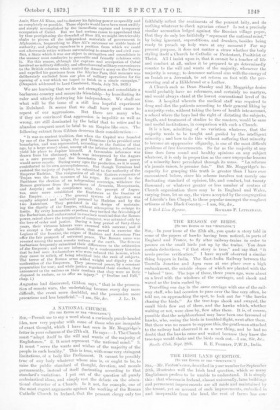OUR FRONTIER POLICY.
[To TUE EDITOR OF THE SPRCTATOR.1
Sin, —The policy of aggression can hardly be in favour just now. The prospect of what is before us in Afghanistan is con- fessedly &gloomy one. Lord Lytton himself has thus described the probable consequences of the impending occupation of Cabal :-
" It was necessary to inflict signal and publio punishment on the late
Amir, Sher All Khan, and to destroy his fighting power as speedily and as completely as possible. Those objects would have been most swiftly and simply accomplished by the immediate capture and temporary occupation of Cabul. But we had serious cause to apprehend that by thus precipitating the downfall of Sher Ali, wo might irretrievably :shake to pieces all the independent materials of government in Afghanistan, bequeathing to Sher Ali's successor no stable basis of authority, and placing ourselves in a position from which we could mot afterwards retire without surrendering to anarchy and civil con- flict, a State which it was our object to strengthen and consolidate in the manner most conducive to peaceable and friendly relations with it. For this reason, although the capture and occupation of Cabul involved no military difficulty, and offered several military conveniences to the British columns which routed the Ameer's army on the Poiwar and expelled his garrisons from the Khyber Pass, that measure was deliberately excluded from our plan of military operations for the opening of a war which we hoped to finish in a single campaign." (Despatch addressed to Lord Cranbrook, Simla, July 7th, 1879.) We are learning that we do not strengthen and consolidate a barbarous country and secure its friendship—by humiliating its ruler and utterly destroying his independence. We shall see what will be the issue of a still less hopeful experiment in Zululand. It seems that we shall have good cause to repent of our aggressions. But there are many who, if they are convinced that aggression is impolitic as well as
wrong, are still dominated by the belief that to retire and to abandon conquest must be fatal to an Empire like ours. The
following extract from Gibbon deserves their consideration :—
" It was an ancient tradition, that when the Capitol was founded by one of the Roman kings, the god Terminus (who presided over boundaries, and was represented, according to the fashion of that age, by a largo stone) alone, among all the inferior deities, refused to yield his place to Jupiter himself. A favourable inference was drawn from his obstinacy, which was interpreted by the Augurs as a sure presage that the boundaries of the Roman power would never recede. During ninny ages the prediction, as it is usual, 'contributed to its own accomplishment. But though Terminus had resisted the majesty of Jupiter, he submitted to the authority of the Emperor Hadrian. The resignation of all the Eastern conquests of 'Trajan was the first measure of his reign. He restored to the Parthians the election of an independent sovereign, withdrew the Roman garrisons from the provinces of Armenia, Mesopotamia, and Assyria ; and in compliance with the precept of Augus- tus, once more established the Euphrates as the frontier of -the Empire The general systemof Augustus was -equally adopted and uniformly pursued by Hadrian and by the two Antonines. They persisted in the design of maintain- ing the dignity of the Empire, without attempting to enlarge its limits. By every honourable expedient they invited the friendship of the Barbarians, and endeavoured to convince mankind that the Roman power, raised above tho temptation of conquest, was actuated only by the love of order and justice. During a long period of forty-three years, their virtuous labours were crowned with success ; and if we except a few slight hostilities, that served to exercise the Legions of the frontier, the reigns of Hadrian and Antonini'; Phis offer the fair prospect of universal peace. The Roman min ,,,as revered among the most remote nations of the earth. The fiercest barbarians frequently submitted their differences to the arbitration
of the Emperor; and we aro informed I, -Y a contemporary historian
that he bad soon Ambassadors who wore refused the honour, which they came to solicit, of being admitted into the rank of subjects. The terror of the Roman arms added weight and dignity to the -moderation of the Emperors. They preserved peace, by a constant preparation for war; and while justice regulated their conduct, they announced to the nations on their confines that they were as little
disposed to endure, as to offer an injury," (« Decline and Fall," chap. i.) Augustus had discovered, Gibbon says, " that in the prosecu- tion of remote wars, the undertaking became every day more difficult, the event more doubtful, and the possession more
precarious and less beneficial."--I am, Sir, syc. J. LL, D.

































 Previous page
Previous page